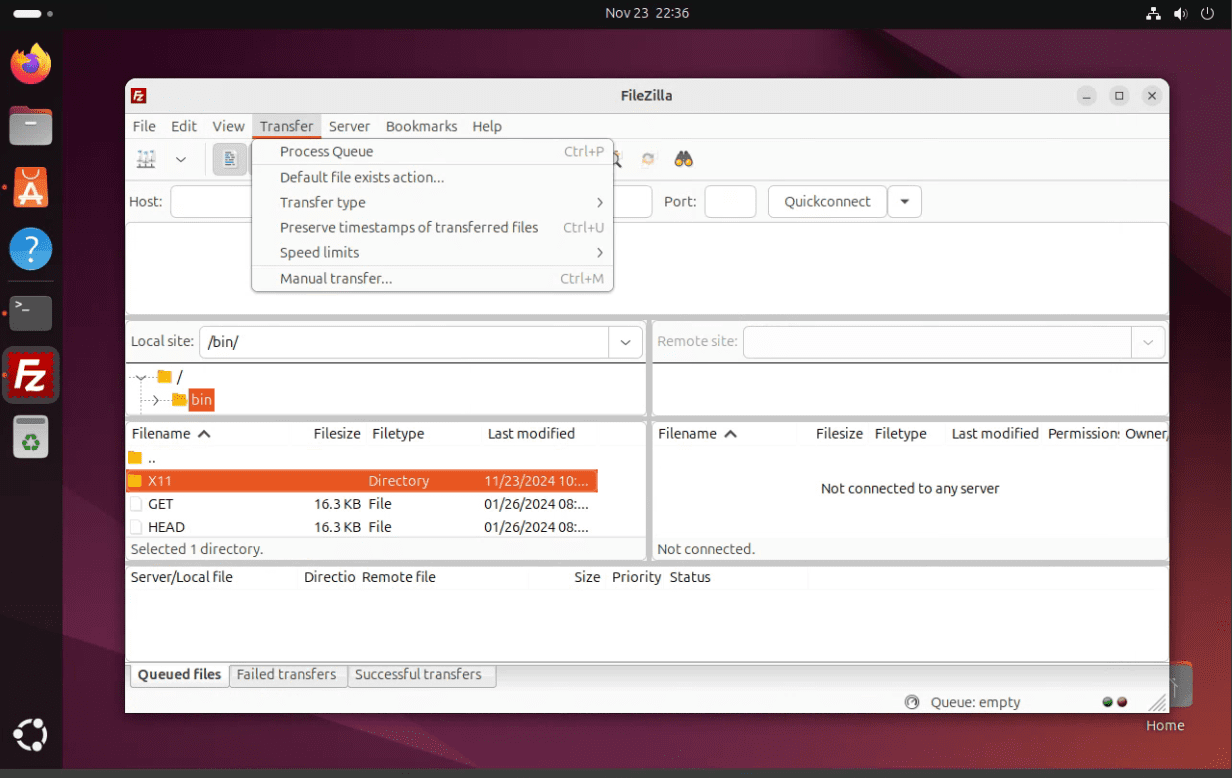If you’re a Linux user, you know the joy of finding tools that “just work.” One area that demands attention, especially for developers, system administrators, and tech enthusiasts, is file transfer. FTP (File Transfer Protocol) clients are essential for transferring files between local systems and servers.
In this blog, I’ll walk you through the 10 best Linux FTP clients of 2024, sharing personal insights.
What makes a good FTP client?
Before diving into the list, let’s define what I look for in a good FTP client:
- Ease of use: The interface should be intuitive, whether GUI or CLI.
- Protocol support: Beyond FTP, support for SFTP, FTPS, or SCP is crucial in modern workflows.
- Performance: Large file transfers shouldn’t choke the system.
- Customizability: Options to tweak settings matter.
- Platform integration: Native support for Linux with minimal dependencies.
1. FileZilla
The reliable workhorse

FileZilla on Ubuntu
FileZilla is arguably the most popular FTP client, offering a straightforward interface and robust functionality. It supports FTP, FTPS, and SFTP protocols, making it versatile. The drag-and-drop functionality makes transferring files a breeze, and its tabbed interface allows multiple connections at once.
Pros:
- Simple GUI with drag-and-drop support
- Supports FTP, SFTP, and FTPS
- Active community and regular updates
Cons:
- GUI feels dated
- Requires adding a PPA for the latest version in some distros
FileZilla is often the first name people think of for FTP. It’s beginner-friendly but packs advanced options like bookmarks and transfer queues. For me, FileZilla shines when dealing with repetitive tasks. However, the clunky interface and dependence on GTK aren’t my favorite.
Quick installation:
# Ubuntu/Debian sudo apt update && sudo apt install filezilla # Fedora/RHEL sudo dnf install filezilla # Arch sudo pacman -S filezilla
2. lftp
My go-to CLI tool
lftp is a CLI-based client known for its scripting capabilities. It’s perfect for automating repetitive tasks like backups or mirroring directories. It supports modern protocols, including FTPS and SFTP, with advanced features like segmented downloading for faster transfers.
Pros:
- Lightweight and scriptable
- Supports FTP, FTPS, SFTP, HTTP/HTTPS
- Mirrors directories efficiently
Cons:
- Steeper learning curve
- Documentation isn’t newbie-friendly
This is my personal favorite for automating FTP tasks. Whether syncing backups or downloading large datasets, lftp’s scripting capabilities are a dream. Its minimal design keeps distractions away, though beginners might find it intimidating at first.
Quick installation:
# Ubuntu/Debian sudo apt update && sudo apt install lftp # Fedora/RHEL sudo dnf install lftp # Arch sudo pacman -S lftp
3. gFTP
A GUI gem for old-school fans
gFTP is a lightweight and straightforward GUI client for basic FTP needs. It doesn’t overwhelm you with features but gets the job done. However, it lacks modern protocol support like FTPS, making it better suited for simple use cases.
Pros:
- Lightweight and snappy
- Simple GUI with no bloat
- Active maintenance despite being an older project
Cons:
- Limited modern protocol support (no FTPS)
- Lacks modern design appeal
gFTP feels nostalgic—it’s like stepping into Linux’s golden age. It’s small, functional, and works right out of the box. I use it on my older systems where performance matters, but I do miss support for FTPS.
Quick installation:
# Ubuntu/Debian sudo apt update && sudo apt install gftp # Fedora/RHEL sudo dnf install gftp # Arch sudo pacman -S gftp
4. KFTPgrabber
KDE users, rejoice!
KFTPgrabber is tailored for KDE users, offering tight integration with the Plasma desktop environment. It supports FTP, FTPS, and SFTP, and includes features like bookmark management and queue control.
Pros:
- Designed for KDE with tight Plasma integration
- FTP, FTPS, and SFTP support
- Bookmark manager and queue control
Cons:
- KDE dependencies
- Development isn’t very active
As a Linux user with occasional tilts toward KDE environments, I appreciate KFTPgrabber’s seamless integration with Plasma. It’s great for occasional FTP tasks, though its stagnated updates limit its appeal for advanced use cases.
Quick installation:
# Ubuntu/Debian (via PPA for updated versions) sudo add-apt-repository ppa:kubuntu-ppa/backports sudo apt update && sudo apt install kftpgrabber # Fedora/RHEL sudo dnf install kftpgrabber # Arch sudo pacman -S kftpgrabber
5. Midnight Commander (mc)
The file manager with FTP superpowers
Midnight Commander is a terminal-based file manager with built-in FTP support. Its dual-pane interface makes managing local and remote files a breeze. It’s highly portable and lightweight, perfect for users who prefer a minimalist setup.
Pros:
- Embedded FTP client in a TUI file manager
- Lightweight and highly portable
- SSH and SFTP support
Cons:
- Outdated design might repel new users
- Requires familiarity with key bindings
Midnight Commander is a classic! It’s not just an FTP client but a file manager that takes you back to terminal-based interfaces. I don’t recommend it to GUI lovers, but for minimalists like me, mc scratches that nostalgic itch.
Quick installation:
# Ubuntu/Debian sudo apt update && sudo apt install mc # Fedora/RHEL sudo dnf install mc # Arch sudo pacman -S mc
6. Cyberduck
Stylish and cross-platform
Cyberduck is a visually appealing FTP client that supports a range of protocols like FTP, SFTP, WebDAV, and cloud storage services. Its intuitive interface makes it a great choice for beginners, though it’s not as lightweight as native Linux clients.
Pros:
- Modern interface
- Supports FTP, SFTP, WebDAV, and more
- Good for large file transfers
Cons:
- GUI-heavy and slightly bloated
- Not native to Linux (requires dependencies)
While primarily a macOS darling, Cyberduck’s Linux support has improved. I use it sparingly for WebDAV connections, but it’s not my daily driver due to its heavy nature on Linux systems.
Quick installation:
Cyberduck isn’t native to Linux and requires Flatpak or Wine:
# Install Flatpak (if not installed) sudo apt install flatpak # Install Cyberduck via Flatpak flatpak install flathub io.cyberduck.Cyberduck
7. ncftp
Lightweight and functional
ncftp is another CLI-based client that’s simple and fast. While it doesn’t support modern protocols like FTPS, its session resume feature and minimal resource usage make it great for quick tasks.
Pros:
- Minimal resource usage
- Advanced command-line capabilities
- Session resume support
Cons:
- Dated interface and commands
- No modern protocol support (e.g., FTPS)
ncftp was my first-ever CLI-based FTP tool, and it still holds a special place. However, I’ve moved to lftp for most tasks, as it offers a broader range of protocols and modern capabilities.
Quick installation:
# Ubuntu/Debian sudo apt update && sudo apt install ncftp # Fedora/RHEL sudo dnf install ncftp # Arch sudo pacman -S ncftp
8. Transfuse
The SFTP-focused tool
Transfuse is a lightweight GUI client designed for SFTP. It’s great for users who only need secure file transfers without the overhead of a full FTP client.
Pros:
- Optimized for SFTP
- Simple GUI for drag-and-drop tasks
- Lightweight and easy to install
Cons:
- Limited to SFTP (not a full FTP client)
- Development pace is slow
When I need a quick SFTP connection and don’t want to deal with terminal commands, Transfuse comes in handy. That said, its narrow scope means it’s a niche tool.
Quick installation:
# Ubuntu/Debian sudo apt update && sudo apt install transfuse # Fedora/RHEL sudo dnf install transfuse # Arch sudo pacman -S transfuse
9. Krusader
A power-packed file manager with FTP
Krusader is a dual-pane file manager that supports FTP, SFTP, and local file management. It’s highly customizable and integrates well with KDE.
Pros:
- Dual-pane interface
- Integrates FTP and SFTP seamlessly
- Rich customization options
Cons:
- Requires KDE dependencies
- Overkill for simple FTP tasks
For file management tasks involving FTP, Krusader is powerful. However, I rarely use it unless I’m already in a KDE environment or dealing with complex directory structures.
Quick installation:
# Ubuntu/Debian sudo apt update && sudo apt install krusader # Fedora/RHEL sudo dnf install krusader # Arch sudo pacman -S krusader
10. CrossFTP
The Java-based all-rounder
CrossFTP supports a variety of protocols and comes with a tabbed interface for managing multiple connections. While its premium version unlocks more features, the free version is sufficient for basic tasks.
Pros:
- Multi-protocol support (FTP, FTPS, SFTP)
- Tabbed interface for multiple connections
- Built-in ZIP and TAR management
Cons:
- Relies on Java (dependency bloat)
- Premium features locked behind a paywall
I have mixed feelings about CrossFTP. While it’s feature-rich and looks polished, its Java requirement makes me cringe. It’s a good backup tool but not my first choice.
Quick installation:
# Download Java sudo apt install default-jre # Download CrossFTP from its website and run java -jar CrossFTP.jar
Conclusion
Choosing the right FTP client for Linux boils down to your needs. For CLI enthusiasts like me, lftp is king. GUI lovers can’t go wrong with FileZilla, while KDE fans may find joy in KFTPgrabber or Krusader. Exploring these tools reminds me why I love Linux—it’s all about having choices!
What’s your favorite Linux FTP client? Drop a comment below, and let’s geek out together!


1 comment
Hi,
Thanks a lot
Very useful article.
but under redhat8 i could not find kftpgrabber , gftp